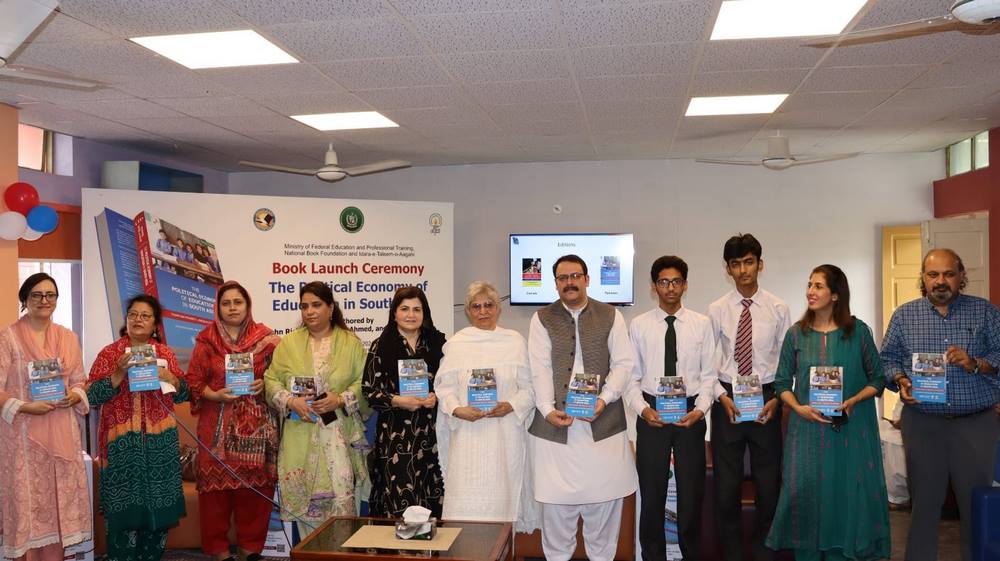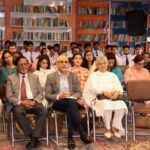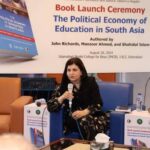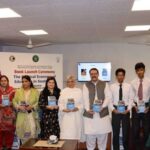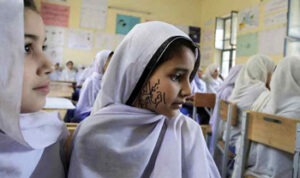
Newly launched book highlights insight into edu reforms
(28 August 2024)
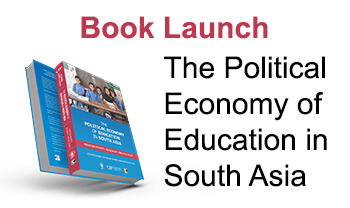
The international book, ‘The Political Economy of Education in South Asia (Pakistan Chapter),’ authored by John Richards, Manzoor Ahmed, and Shahidul Islam, was officially launched here on Wednesday.
The event was graced by esteemed guests of honor, including Farah Naz Akbar, Member of the National Assembly, and Dr. Mukhtar Ahmed, Chairman of the Higher Education Commission Dr Mukhtar Ahmed.Ministry of Federal Education and Professional Training, Idara-e-Taleem-o-Aagahi (ITA), and the National Book Foundation jointly organized the book launch.
The “Political Economy of Education in South Asia (Pakistan Edition)” has been critically reviewed by distinguished academics, including Dr. Faisal Bari, Associate Professor of Economics and Education at the Lahore University of Management Sciences (LUMS), Dr. Farid Panjwani, Dean at the Aga Khan University Institute for Educational Development (AKU-IED), and Dr. Rabea Malik, CEO and Fellow at the Institute of Development and Economic Alternatives (IDEAS).
Dr. Faisal Bari emphasized the book’s significance, stating, “The book is timely. If we are to achieve the SDG education targets and other international and national commitments, the work needs to pick up pace. The ideas for reform and change presented in the book are well-researched and supported by academic and policy literature. We hope the book gains readership among all relevant education and policy constituencies.”
The book delves into the challenges of weak core competency outcomes in government primary schools across South Asia, specifically in Pakistan, India, Bangladesh, and Nepal.
It examines the rapid expansion of non-government schools over the past two decades and compares teacher training, hiring, and management in South Asian schools with those in Singapore and Finland. The authors argue that public good and priorities are better served when both public and non-government education providers operate within a robust public policy and accountability framework. Drawing on extensive research and practice in South Asia, the book underscores the importance of universal literacy and numeracy as foundational elements for economic growth.
It also highlights the critical need for comprehensive reforms to address the educational challenges facing the region.
Dr. Farid Panjwani added his perspective, noting that the comparative approach taken by the authors is a significant contribution to the field.
“The history of reforms, particularly under international pressure, and the section on cones of exclusion are very appealing. The synthesis of existing research and the emphasis on public education and the role of the state are powerful elements of the book,” he said.The launch of “The Political Economy of Education in South Asia (Pakistan Chapter)” marks a pivotal moment in the ongoing discourse on education reform in South Asia. The book is expected to serve as a critical resource for policymakers, educators, and researchers committed to improving educational outcomes across the region.
Ministry of Federal Education and Professional Training Pakistan
Launch of "The Political Economy of Education in South Asia (Pakistan Chapter)"
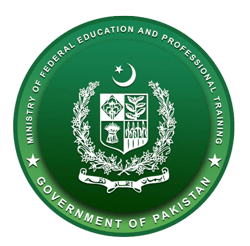
Launch of “The Political Economy of Education in South Asia (Pakistan Chapter)” Highlights Critical Insights into Education Reform Islamabad, 28th August: The international book, ‘The Political Economy of Education in South Asia (Pakistan Chapter),’ authored by John Richards, Manzoor Ahmed, and Shahidul Islam, was officially launched today in Islamabad, Pakistan. The event was graced by esteemed guests of honor, including Farah Naz Akbar, Member of the National Assembly, and Dr. Mukhtar Ahmed, Chairman of the Higher Education Commission. The Ministry of Federal Education and Professional Training, Idara-e-Taleem-o-Aagahi (ITA), and the National Book Foundation jointly organized the book launch.
The “Political Economy of Education in South Asia (Pakistan Edition)” has been critically reviewed by distinguished academics, including Dr. Faisal Bari, Associate Professor of Economics and Education at the Lahore University of Management Sciences (LUMS), Dr. Farid Panjwani, Dean at the Aga Khan University Institute for Educational Development (AKU-IED), and Dr. Rabea Malik, CEO and Fellow at the Institute of Development and Economic Alternatives (IDEAS).
Dr. Faisal Bari emphasized the book’s significance, stating, “The book is timely. If we are to achieve the SDG education targets and other international and national commitments, the work needs to pick up pace. The ideas for reform and change presented in the book are well-researched and supported by academic and policy literature. We hope the book gains readership among all relevant education and policy constituencies.”
The book delves into the challenges of weak core competency outcomes in government primary schools across South Asia, specifically in Pakistan, India, Bangladesh, and Nepal. It examines the rapid expansion of non-government schools over the past two decades and compares teacher training, hiring, and management in South Asian schools with those in Singapore and Finland. The authors argue that public good and priorities are better served when both public and non-government education providers operate within a robust public policy and accountability framework.
Drawing on extensive research and practice in South Asia, the book underscores the importance of universal literacy and numeracy as foundational elements for economic growth. It also highlights the critical need for comprehensive reforms to address the educational challenges facing the region.
Dr. Farid Panjwani added his perspective, noting that the comparative approach taken by the authors is a significant contribution to the field. “The history of reforms, particularly under international pressure, and the section on cones of exclusion are very appealing. The synthesis of existing research and the emphasis on public education and the role of the state are powerful elements of the book,” he said.
The launch of “The Political Economy of Education in South Asia (Pakistan Chapter)” marks a pivotal moment in the ongoing discourse on education reform in South Asia. The book is expected to serve as a critical resource for policymakers, educators, and researchers committed to improving educational outcomes across the region.

Fighting Poverty, Inequality, and Exclusion
With the exception of Sri Lanka, South Asian countries have not achieved quality basic education – an essential measure for escaping poverty, inequality, and social exclusion. In The Political Economy of Education in South Asia, John Richards, Manzoor Ahmed, and Shahidul Islam emphasize the importance of a dynamic system for education policy.

